Melatonin is a sleep hormone that helps the body transition into rest mode. If you struggle with sleep issues and want to take melatonin supplements as a natural sleep aid, proper dosing is the key to getting results.

Research shows that melatonin supplements can help improve sleep and reset the body’s sleep-wake cycle. It can help people fall asleep faster and reduce daytime fatigue. If you’re thinking about taking melatonin sleep gummies for the first time, you’ll want to make informed decisions about dosing the product effectively.
When used appropriately, melatonin is generally safer than taking prescription sleeping pills, but too much isn’t good.
All of our melatonin gummies contain just 3 mg of melatonin with low doses of hemp-derived cannabinoids.
Melatonin and Sleep
The sleep cycle is a recurring pattern that the body goes through during the night, involving different stages of sleep. It is regulated by the brain’s internal clock, known as the circadian rhythm. The circadian rhythm influences the timing of biological functions over 24 hours. It is driven by an intricate network of molecular and cellular processes that are synchronized with external cues like light and darkness.
Melatonin is a hormone our bodies produce naturally in the pineal gland of the brain in response to darkness. It promotes the onset of sleep and facilitates the transition into various sleep stages, including REM sleep.
Melatonin levels typically rise in the evening as night falls, promoting feelings of sleepiness and preparing the body for rest. This hormone decreases in the daylight, helping to promote wakefulness.
The body’s production of melatonin is influenced by the amount of light exposure it receives, including blue light from electronic devices and artificial lighting. Exposure to light during the evening can suppress melatonin production and disrupt the sleep-wake cycle.
Some other factors that could impact melatonin levels are chronic stress, high levels of anxiety, alcohol consumption, and caffeine close to bedtime.
Low levels of melatonin cause a delay in sleep onset, making it difficult to fall asleep after getting into bed. Insufficient melatonin can also lead to sleep disruption, causing you to wake up during the night. Even if you manage to sleep for a sufficient duration, low melatonin levels make for poor sleep quality.
Melatonin sleep supplements are a popular over-the-counter sleep aid that can regulate sleep patterns where the natural production of the hormone is impaired or disrupted. Taking a dose of melatonin can be particularly helpful for those who are adjusting to changes in sleep patterns or who have trouble transitioning to sleep.
If you’re looking for the best sleep gummies for adults, check out our Sleep Gummies infused with 100% organic hemp extracts and all-natural ingredients and flavors.
How Much Melatonin is Safe to Take?
Research shows that 1 to 5 mg of melatonin seems to be an effective starting dose for adults. Based on research put out by Johns Hopkins Medicine, over three million Americans use melatonin. The appropriate dosage of melatonin supplements can vary depending on your age and weight, sleep condition, and sensitivity to the sleep aid. While melatonin supplements are generally safer than other sleep medications, everyone’s response to melatonin is unique.
Some melatonin products have 20 mg or more per serving as the recommended dosage, but that doesn’t mean that’s what you should take. Taking a higher melatonin dosage won’t necessarily lead to better results. Certain individuals may find that their sleep improves with a very low dose, while others need a slightly higher one. To avoid side effects, try to find the lowest dose for your needs.
If you don’t feel your dose of melatonin has worked, do not take melatonin twice in one night. You can choose to slightly increase your dose the following evening, but you don’t want to risk overconsuming the hormone.
According to the Sleep Foundation, melatonin supplements work best when taken a few hours before bedtime to regulate the body’s natural circadian rhythm. Our Sleep Plus Gummies with melatonin are fast-acting, with the onset of effects occurring in as little as 15 minutes. Read our guide to learn more about how long it takes melatonin to kick in.
What Happens If You Take Too Much Melatonin?
Taking too much melatonin for sleep could be counterproductive. High melatonin levels can confuse the body’s circadian rhythm, leading to difficulties falling asleep, staying asleep, or waking up at appropriate times. People who take too much melatonin might also experience vivid dreams or nightmares.
Excessive melatonin intake can cause side effects like grogginess and daytime sleepiness, affecting cognitive function and wakefulness. This melatonin imbalance may result in mood changes like irritability or feeling depressed. Some people might experience nausea or stomach cramps when taking too much melatonin.
Melatonin’s involvement in regulating the circadian rhythm indirectly impacts blood pressure. When melatonin levels rise, blood pressure tends to decrease, promoting a state of relaxation and sleep. Taking too much melatonin over time could cause low blood pressure.
Excessive melatonin use can also affect hormone production through its influence on the pineal gland and its interactions with other hormone-regulating systems. Melatonin’s impact on hormone production is most notable in its relationship with gonadal hormones like testosterone and estrogen. Melatonin levels can affect the release of these hormones by interacting with the pituitary gland.
Who Should You Take Melatonin?
Melatonin supplements are considered safe for those who have sleep disturbances or disruptions in their sleep-wake cycle. It’s most suitable for those facing temporary sleep issues due to stress, illness, or changes in their routine.
Melatonin helps reset the body’s internal clock, reducing the effects of jet lag for those who travel across time zones. It’s also useful for shift workers who experience irregular sleep schedules, helping to facilitate the adaptation of a new sleep cycle.
If you travel often for work or have a rotating schedule, stock up on our Sleep 2-Month Bundle. You’ll get three bottles of our wild strawberry-flavored, plant-based sleep gummies. You can even freeze your edibles to ensure they last for a long time. Read our guide about how to store your edibles properly for optimal freshness.
Delayed Sleep Phase Disorder (DSPD) is a type of circadian rhythm sleep disorder where the natural sleep-wake cycle is shifted later than the conventional schedule. Melatonin can help regulate delayed sleep-wake patterns by advancing the sleep phase, helping people fall asleep and wake up at desired times.
The National Center for Biotechnical Information reported that chronic insomnia impacts around 30% of people worldwide. This sleep disorder is characterized by the inability to experience restorative sleep. Sleep deprivation can impact your cognitive, physical, and emotional functions. People with insomnia will often experience a delay in the onset of melatonin secretion. Low melatonin levels can make it harder to initiate and maintain sleep. Taking melatonin for insomnia could reduce sleep latency and improve sleep quality.
Is it Okay to Use Melatonin Every Night?
Melatonin supplements are meant to be used for specific purposes and short-term challenges. Regularly taking the supplement can impact the effectiveness of melatonin over time. Taking melatonin supplements could eventually disrupt the natural melatonin production in the body. Long-term use of melatonin should only be done under the guidance of a medical professional.
Is Melatonin Safe?
Melatonin supplements are safe for many sleep issues, but some sleep conditions cannot be improved with melatonin. Do not try to supplement melatonin if you have sleep apnea. Based on research by Cleveland Clinic, sleep apnea is a sleep disorder that causes recurring interruptions in breathing during sleep.
These interruptions are known as apneas, resulting in brief awakenings as the body struggles to restore normal breathing. Sleep apnea causes the upper airway muscles to relax. When you take melatonin, your muscles will relax even more. This can make sleep apnea worse by sagging the airway muscles.
An article by the Mayo Clinic shows that melatonin could also interact with other medications. If you take anticoagulants, anticonvulsants, or diabetic medication, you should consult with a doctor before using melatonin. Though research is still limited, those who are taking birth control pills should proceed with caution. Interactions with birth control could increase melatonin’s side effects.
If you’re unsure if melatonin is right for you, talk to a sleep doctor or sleep medicine specialist. Depending on the root cause of your sleep issues, they can recommend a treatment plan.
In case you want to try melatonin to see how your body reacts but aren’t ready to go all-in, try our Sleep Sampler. This four-pack of sleep gummies gives you the chance to try them out without committing to a full bottle.
Product QUIZ
Need help deciding what product is best for you? Take our quiz, just three questions until your perfect match!
What Melatonin Doses are Best for Children?
Melatonin could be beneficial for certain pediatric sleep disorders, but it’s essential to consider the appropriate melatonin dosage for children. Children under the age of five should not exceed 2 mg of melatonin. It is recommended that children under 12 take between 1 and 3 mg of melatonin. Teens should start with no more than 5 mg of melatonin per dose. Look for high-quality products that are made for pediatric consumers.
According to an article by the American Academy of Pediatrics, those looking to give melatonin to children and adolescents should make sure the product is certified by a third-party lab. Side effects of low-quality melatonin could cause grogginess, headaches, and mood swings.
What Are Natural Ways to Improve Sleep?
There are many natural ways to improve sleep hygiene besides taking melatonin. Establishing a consistent sleep schedule could offer the consistency your body’s internal clock needs to self-regulate. Consider developing a pre-sleep routine that calms you down and lets your body know it’s time to unwind. Limit your exposure to screens before bed, as the blue light emitted by phones and computers interferes with melatonin production and disrupts the natural sleep cycle.
Don’t underestimate the power of a good mattress. As more people find themselves struggling with sleep, brands like Sleep Experts are helping people find the best fit for their personal needs. Whether a memory foam mattress, a soft mattress, or one specifically for stomach sleepers, you might want to try a few to see what offers more comfort.
If you experience night sweats that disrupt your sleep, consider a cooling mattress that helps regulate your body temperature. You might find that the firm mattresses you’re used to are not helping your sleep issue. Consider memory foam mattress toppers that offer a cozy, softer surface for a restful night’s sleep.
Melatonin FAQ
Is 10 mg of melatonin too much?
10 mg is a high melatonin dosage for adults. Many adults choose to start with as little as 0.5 mg of melatonin to see how their bodies react. 1 to 5 mg of melatonin is a standard dose for adults. Exceeding more than 5 mg of melatonin should be done under a professional’s supervision.
Our melatonin gummies for adults meet you right in the middle with 3 mg of melatonin per dose.
Is it okay to take 20 mg of melatonin?
It is not recommended to take 20 mg of melatonin. 20 mg is an excessively high dosage for adults and can cause side effects like headaches, dizziness, nausea, and daytime irritability. Excessive use of these supplements in high doses could disrupt the natural production of melatonin in the body. 5 mg or less of melatonin is a safe dosage amount.
That’s why our melatonin gummies only have 3 mg. Try our full-spectrum Sleep Plus Gummies with low doses of hemp-derived cannabinoids for enhanced relaxation.
Can you overdose on melatonin?
It is possible to experience a melatonin overdose. Taking too much melatonin can result in excessive drowsiness, headaches, dizziness, and irritability. Some people experience stomach cramps and nausea, while others might feel confused and disoriented. Melatonin overdose can also lead to fluctuations in blood pressure and disrupt the natural process of melatonin production in the body. Start with the lowest dose possible to see how your body reacts.
Is it safe to take melatonin when pregnant?
If you are pregnant or breastfeeding, avoid melatonin use without consulting with your doctor. Many women have reported experiencing insomnia and other sleep issues while pregnant. However, there is not enough research to determine the effects of melatonin on the fetus. Since melatonin is a hormone, melatonin supplements could disrupt the hormonal balance needed for a healthy pregnancy.
Can you take melatonin with alcohol in your system?
It is not recommended to take melatonin with alcohol in your system. Alcohol can negatively interact with melatonin and its effectiveness. Alcohol does disrupt sleep patterns, but adding melatonin to the mix might not necessarily counteract the negative effects of alcohol on sleep quality. Both alcohol and melatonin have sedative effects on the central nervous system. When taken together, these effects can be enhanced, leading to excessive drowsiness and impaired cognition.
Is melatonin FDA approved?
Melatonin is regulated as a dietary supplement according to the Food and Drug Administration (FDA). This means there are fewer regulatory restrictions on the supplement and what can be sold over the counter. Look for brands, like us, that provide third-party lab test results about their products, so you know you’re getting quality ingredients. All of our vegan CBD gummies have been tested for quality assurance.
Resources
https://publications.aap.org/aapnews/news/16325/Thinking-about-melatonin-to-help-kids-sleep-Ask?autologincheck=redirected. (n.d.). https://publications.aap.org/aapnews/news/16325/Thinking-about-melatonin-to-help-kids-sleep-Ask?autologincheck=redirected
Melatonin. (2023, August 10). Mayo Clinic. https://www.mayoclinic.org/drugs-supplements-melatonin/art-20363071
C. (n.d.). Sleep Apnea: What It Is, Causes, Symptoms & Treatment. Cleveland Clinic. https://my.clevelandclinic.org/health/diseases/8718-sleep-apnea
Roth, T. (n.d.). Insomnia: Definition, Prevalence, Etiology, and Consequences. PubMed Central (PMC). https://www.ncbi.nlm.nih.gov/pmc/articles/PMC1978319/
Melatonin Dosage by Age and Weight | Sleep Foundation. (2021, May 28). Sleep Foundation. https://www.sleepfoundation.org/melatonin/melatonin-dosage-how-much-should-you-take
Melatonin for Sleep: Does It Work? (2022, April 11). Melatonin for Sleep: Does It Work? | Johns Hopkins Medicine. https://www.hopkinsmedicine.org/health/wellness-and-prevention/melatonin-for-sleep-does-it-work
UpToDate. (n.d.). UpToDate. https://www.uptodate.com/contents/pharmacotherapy-for-insomnia-in-adults#H2582713949
Costello, R. B., Lentino, C. V., Boyd, C. C., O’Connell, M. L., Crawford, C. C., Sprengel, M. L., & Deuster, P. A. (2014, November 7). The effectiveness of melatonin for promoting healthy sleep: a rapid evidence assessment of the literature. PubMed Central (PMC). https://doi.org/10.1186/1475-2891-13-106
nama CBD FDA & Legal Disclaimer
Our products are not intended to diagnose, treat, cure, or prevent any disease. They are not a replacement for prescription medications and have not been evaluated by the FDA (Food and Drug Administration).
The information provided on this website does not, and is not intended to, constitute legal advice or any statements of the status of any laws. Any information, content, and materials available on this site are for general informational purposes only, and are not intended to be relied upon for any purpose.
Readers of this website should contact their attorney to obtain advice with respect to any particular legal matter including decisions on what products are, or are not, legal to sell, possess, or consume. No reader, user, or browser of this site should act or refrain from acting on the basis of information on this site without first seeking legal advice from their own counsel in the relevant jurisdiction.
Only your individual attorney can provide assurances that the information contained herein – and your interpretation of it – is applicable or accurate for your particular situation. Use of, and access to, this website or any of the links or resources contained within the site do not create an attorney-client relationship between the reader, user, or browser, and website authors, contributors, contributing law firms, or committee members and their respective employers.
More articles
About
Learn
Join us on this journey

© Copyright 2025 nama Products LLC. All Rights Reserved.
†These statements have not been evaluated by the Food and Drug Administration. These products are not intended to diagnose, treat, cure or prevent any disease. All information presented here is not meant as a substitute for or alternative to information from health care practitioners. Please consult your health care professional about potential interactions or other possible complications before using any product.
††The information provided on this website does not, and is not intended to, constitute legal advice or any statements of the status of any laws. Any information, content, and materials available on this site are for general entertainment purposes only, and are not intended to be relied upon for any purpose.
123 John Doe Street
Your Town, YT 12345
Store Hours
Sun: Closed
Mon-Fri: 9:00 - 17:00
Sat: 10:00 - 13:00
What to expect at pickup
Closed
Closing at 5pm
Closing at 5pm
Closing at 5pm
Closing at 5pm
Closing at 5pm
Closing at 1pm

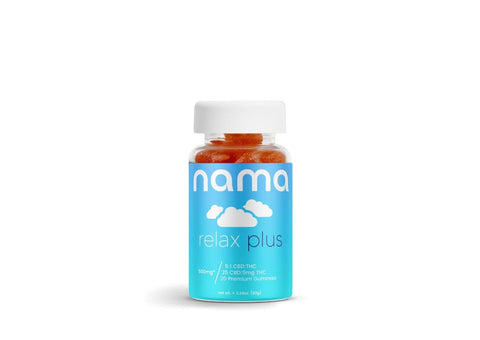

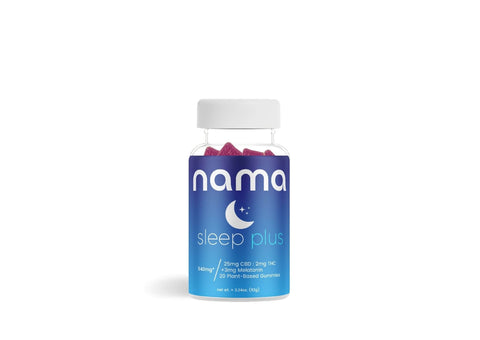
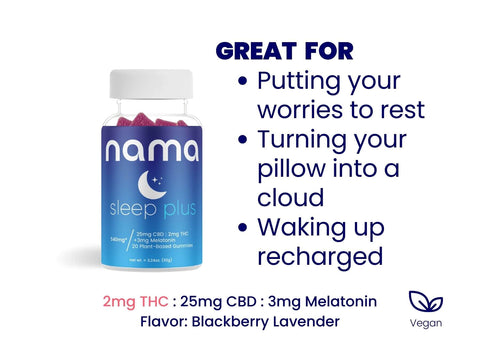
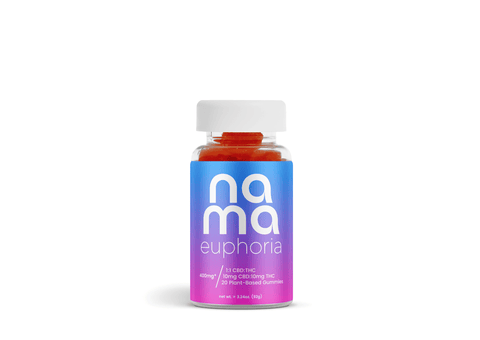
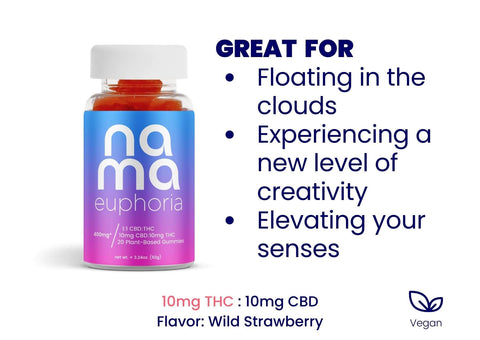
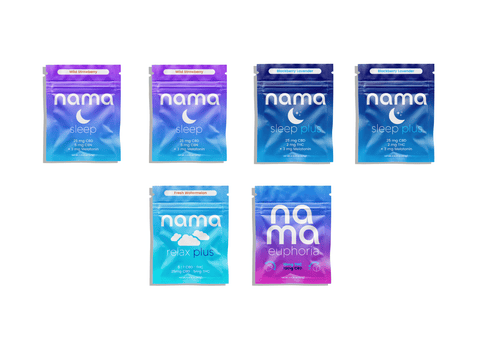
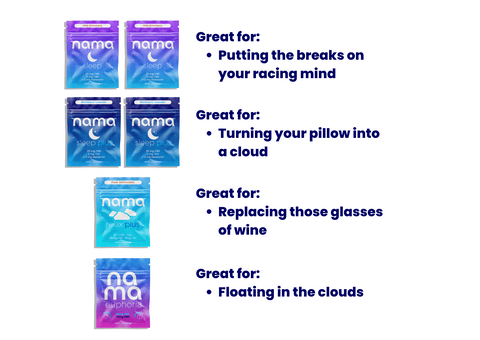
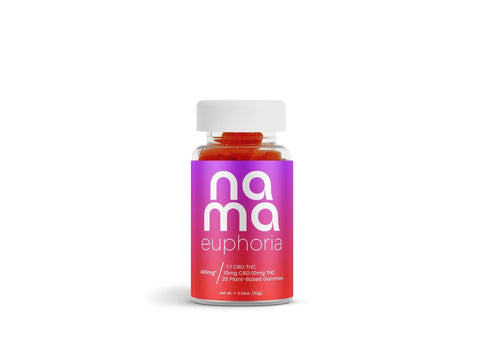

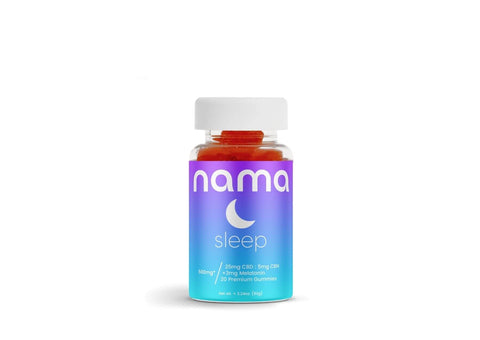
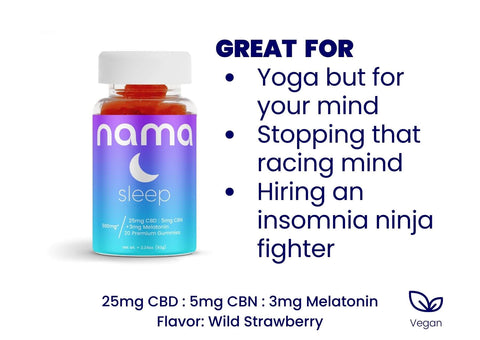
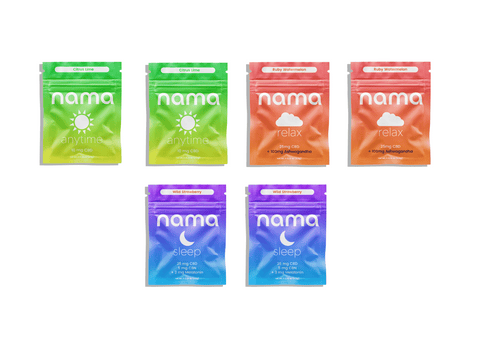
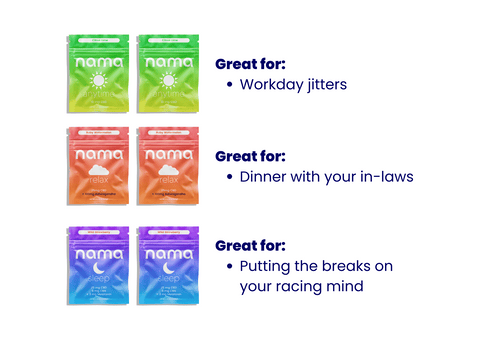









![Buzz Packs™ [THC and CBD Powder Drink Mix]](http://www.namacbd.com/cdn/shop/files/nama_buzz_packs_thc_drink_pack_white_background.png?v=1741884660&width=480)
![Buzz Packs™ [THC and CBD Powder Drink Mix]](http://www.namacbd.com/cdn/shop/files/Buzz_Packs_Label.png?v=1741884660&width=480)


![Buzz Drops™ [THC Drink Drops]](http://www.namacbd.com/cdn/shop/files/nama_thc_buzz_drops.png?v=1711412866&width=480)
![Buzz Drops™ [THC Drink Drops]](http://www.namacbd.com/cdn/shop/files/buzz-drop-wine-comparison.png?v=1736882023&width=480)



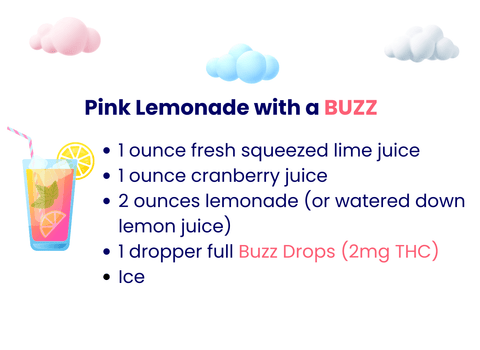


Comments (0)
There are no comments for this article. Be the first one to leave a message!